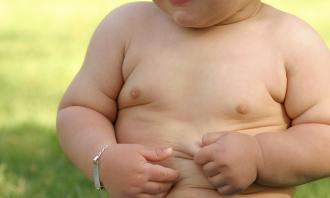As parents, we are always juggling that fine line between encouraging our kids to eat healthy and not wanting them to become obsessive about food and their body weight.
However, a new study suggests that some parents are in denial about the fact that their children are carrying too much weight.
If you don’t know, how can you help?
When researchers asked 4,437 Western Australian parents, between 2009 and 2012, to record their child’s height and weight, the results revealed that about 16 per cent of the kids were overweight and six per cent were obese.
But when the parents were asked if they regarded their children, all aged between five and 15, as having a healthy or unhealthy weight, only about eight percent said they had overweight kids and just 0.2 per cent believed that they had an obese child.
Alarmingly more than half of the parents with children above or below the healthy weight range reported an intention to “do nothing” about their child’s weight in the study conducted as part of the Western Australia Health and Wellbeing Surveillance System.

Of the 4,437 parents surveyed, eight percent recorded their child as overweight or obese.
Parents misjudge their child’s weight status
“Parents often perceive their child to be in a lower body mass index (BMI) category than is actually the case,” the report stated.
“A large proportion of parents misjudge their child’s weight status and the majority express no intention to help their child achieve a healthy weight.
“The results reinforce the importance of population-level, parent-focused interventions targeting perceptions of children’s weight and appropriate action.”
Their health is on the line
Considering as many as a quarter of our children aged five to 17 are overweight or obese - according to the Australian Bureau of Statistics’ Australian Health Survey (2011/13) – it would seem that we parents need a serious reality check.
This disturbing figure means that one in every four children are carrying around too much weight for what is deemed healthy by the Australian national health guidelines.
Evidence suggests that overweight or obesity in childhood is associated with “developmental, mental health and physical health problems as well as premature mortality and morbidity during adulthood.”

Nutritionists urge parents not to let their kids control the grocery shopping trips.
Although health problems are less common in childhood, children who continue to be overweight into adulthood are at greater risk of developing:
- High blood fats and heart disease
- Type 2 diabetes
- High blood pressure
- Stroke
- Joint problems
- Breathing problems
- Some forms of cancer
It is rare for a medical condition to cause a child to become overweight, but always check with your doctor if you are concerned.
Your own weight might be playing a part
While many parents feel helpless in the face of societal and cultural norms, Queensland-based accredited practising dietitian Clare Evangelista believes there is much parents can do to help keep our kids healthy and happy.
“Talk to your kids about advertising,” she told Kidspot. “Engage them, make them aware of advertising tricks.”
She also believes it’s important to take on the problem as a family issue.
“The key thing is to recognise that childhood nutrition is based on family nutrition,” she says. “The structure of family eating has an effect. If you’re overweight, your child is more likely to be overweight.”
Children become overweight when the energy they ‘take in’ (through food and drink) is greater than the energy they ‘put out’ (through physical activity and exercise). A diet high in energy and fat, combined with low levels of physical activity and exercise, will lead to a person becoming overweight.
Children may inherit body type and shape from their parents, and you cannot change that, but you can influence your child’s eating habits and activity patterns, which will also affect their body weight.
Ways to encourage healthy changes to your child’s eating habits
Suggestions include:
- Buy, prepare and offer the foods you would like your child to eat. Allow them to choose what and how much of these foods they will eat.
- Keep offering healthy foods even if they are refused at first.
- Include your child’s food choices in the family menu sometimes.
- Act as a role model. Make sure your child sees you eating healthy foods.
- Involve children in simple food preparation such as making a salad.
- Let your child decide if they have had enough, even if food is left on their plate. This encourages children to better understand feelings of hunger and fullness. These habits may help to control appetite and prevent overeating as they grow.
- Encourage slow eating if yours is a family of fast eaters. Put your knife and fork down between mouthfuls. Offer crunchy foods that need lots of chewing.
- Help your child recognise if he or she eats when bored, sad or lonely. Try to suggest another activity to help distract them.
- Try not to punish, reward or cheer your child up with food. It can be tempting to use food this way sometimes, but it establishes an unhealthy relationship with food.
As Clare Evangelista points out, children are not in control of grocery shopping and, up to early teen years, do not have much access to food independent of their parents.
“It’s up to parents to offer better options,” she says. “Get back in touch with how much food your child actually needs, whether they’re eating because they’re hungry or for other reasons such as boredom.
“Teach them how often treats are appropriate – the old adage ‘all things in moderation’ still holds true.”
For more information go to Better Health Channel






















